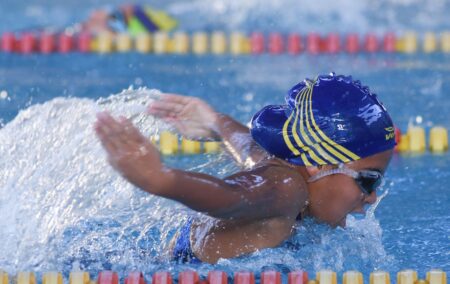You’ll find racism if you want to. And not just the genuine racism. You’ll find ghost racism. You’ll turn it up in silly rules, odd decisions, and unexpected gusts of wind. This is dangerous. It diminishes the gravity of genuine racism.
I spotted a striking case of phantom racism in an EWN piece around the Olympic Games. Almost every claim made by author Haji Mohamed Dawjee in “The obscene and overt racism of the Olympics” is a baseless cry of racism, apparently the result of desperately wanting to find it.
Mean-spirited rule
First, she reports that “the Olympics has officially banned the swim-cap brand Soul Caps – a swimming cap designed specifically to cater to the needs of black swimmers.” As the company’s marketing niftily puts it, these larger caps are “Haircare for the volume-blessed”. Indeed, it seems Fina, the sport’s governing body, rejected a request to approve these caps for Olympic use, arguing that they failed to follow the “natural form of the head”.
Dawjee argues this means “any athlete who is not white, or who [has] African hair styled in braids, weaves, extensions or just naturally is cited as a deformity.” That is to read in a great deal from somewhere else. White people can also have hairstyles that would benefit from these larger swimming caps.
In fairness, the ruling does feel mean spirited. It seems a silly rule. Without proof of some unfair advantage the caps confer, I’d call this stale bureaucracy before declaring racism.
Of course, it could be racism. If it is, it is veiled. Certainly not overt, as Dawjee claims. But we don’t know.
Dawjee unearths more “racism” in a ruling by World Athletics that disqualified the Nigerian relay team. As she says, that body “has yet to release a statement on the exact reasons for the disqualification and has simply based their decision on what they believe are technical errors.”
As a universal rule, when you are punished you deserve an explanation. If this ban was handed down without reasoning, that is unacceptable.
It has since emerged that the ban was based on doping violations. Again, athletes of all races face those. It might have been racist. Or something else.
No obvious motivation
World Athletics is also an organisation with no obvious motivation to be racist towards Africans. African and black athletes from around the globe are some of their finest performers. Certainly, in track events, these athletes are dominant and celebrated.
American athlete Gwen Berry attracted both applause and condemnation for turning away from her country’s flag during the medal ceremony at the US track and field Olympic trials. She had won bronze in the hammer throw and qualified for the Games.
Dawjee likens Berry’s situation to that of NFL player Colin Kaepernick kneeling during the national anthem before matches. Injecting sexism too, she says Berry is “one of many who in recent years have become the targeted black body of coercive patriotism whereby national leaders and organisations indignantly demand that athletes show reverence for their country or suffer career-ending consequences.”
The inference is that a white athlete who turned away during the anthem would not be condemned. That seems unlikely. But it is possible.
Then Dawjee turns to the ban of American sprinter Sha-Carri Richardson. She was disqualified from Olympic participation for a positive marijuana test. Dawjee’s response: “here we are, offering up another black woman as a devastating example of discrimination and demonisation”. Again, without evidence.
Doping
Marijuana is on the World Anti-Doping Agency’s list of banned substances. It does seem a silly rule. Sports scientist Ross Tucker recently addressed the issue in his podcast, confirming the lay assumption that weed is not a performance enhancer. He suggests the reason may be that it is unfair in that it helps athletes relax outside of competition. That seems a petty reason. Dawjee somehow finds racism in application of a rule.
White athletes have also been banned for marijuana. In 2009 Michael Phelps, one of the greatest swimmers of all time, was banned from competition and lost major sponsorship deals after photos emerged of him smoking marijuana leaked online.
In her hammer blow, Dawjee declares: “Black athletes, especially black women athletes, have long been the subject of rumours. They constantly move with a target on their backs, their lives are policed, they are tested for steroids more than athletes of other races to discredit their talents and their excellence.”
No evidence is provided.
This unearthing of “racism” without justification is not just incorrect. It is damaging. It fuels racism. Worse, it diminishes the seriousness of real racism.
Look again to America. Democrat politicians now habitually call the several recent Republican state voting bills “Jim Crow laws”. Joe Biden has called Georgia’s recent elections bill “Jim Crow in the 21st century” and “an atrocity”.
Jim Crow laws were the real deal, bare-faced and brutal racism. Separate park benches, segregated restrooms, and inferior education for black youngsters. America’s apartheid, if you like. The sort of thing that Rosa Parks fought.
The voting bills so hated by Democrats are nothing of the sort. The challenges are to rules that do things like control mail-in ballots and require voter ID.
Finding racism in these demonstrates a desperate need to find it.
Sincere efforts to uncover and deal with racism are noble. They help build society. Probes that find racism where there is none are deceptive. They set us all back.
The views of the writer are not necessarily the views of the Daily Friend or the IRR
If you like what you have just read, support the Daily Friend
Image by roxdicarlo from Pixabay

